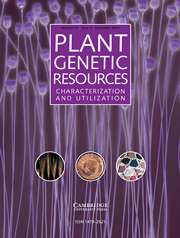No CrossRef data available.
Article contents
Selection of inbreds with better combining ability is instrumental in developing CMS-based heterotic hybrids in tropical carrot (Daucus carota L.)
Published online by Cambridge University Press: 08 September 2023
Abstract
Carrot is an important vegetable crop worldwide valued for its fleshy edible roots of varied colours. Owing to its highly cross-pollinated nature and small flower size, cytoplasmic male sterility (CMS) is being utilized for hybrid development. Among different types of male sterility, petaloid CMS is widely used for hybrid carrot breeding globally. This study aimed to develop selection criteria for parents in developing heterotic F1 hybrids using CMS lines. A large number of agro-morphological traits and Simple Sequence Repeats (genomic-SSRs) were used to assess the diversity among parental lines. We developed 60 F1 hybrids by crossing four petaloid CMS lines and 15 testers in line × tester mating design and evaluated them in replicated randomized block design trial for four vegetative and 11 economic traits. The mean squares of all the traits in line × tester interactions were significant. The estimates of genetic components of variance indicated predominance of non-additive gene action except for root maturity, root length and core diameter. The hybrids with highest per se performance also had significant positive specific combining ability effects. The root yield and root weight showed highest heterosis percentage (33%). The best performing heterotic hybrids were DCatH-5392, DCatH-700 and DCatH-9892. Correlation between genetic distance and relative heterosis of economic traits indicated no significant association and thus genetic distance could not be used to predict heterosis. As most of the yield-related traits were controlled by non-additive gene action, heterosis breeding could be potentially used along with combining ability analysis to reduce time in selection of best parents and crosses in tropical carrot.
Information
- Type
- Research Article
- Information
- Copyright
- Copyright © The Author(s), 2023. Published by Cambridge University Press on behalf of National Institute of Agricultural Botany

